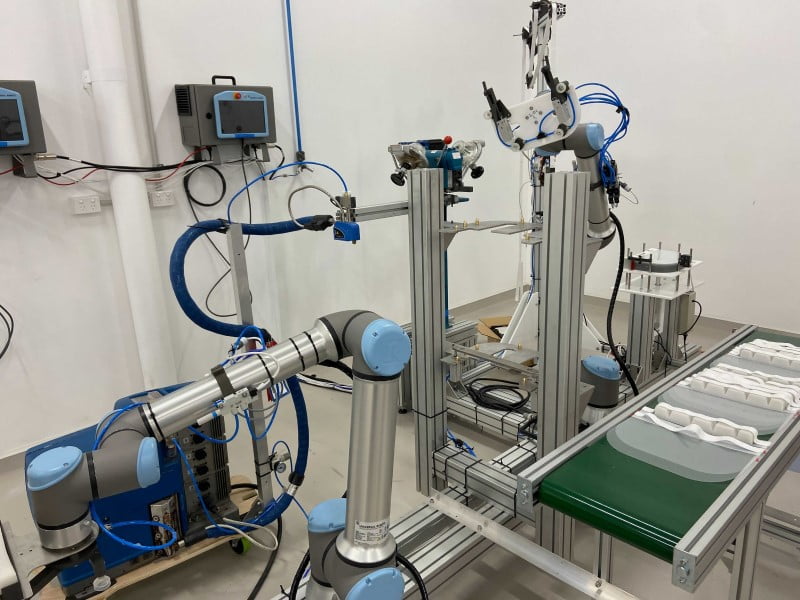The executive director of Western Australian advanced manufacturing firm Adarsh Australia has called on the new federal government to enhance their procurement of local goods as the company finalises terms of the grant received through the Modern Manufacturing Initiative.
Founded 25 years ago by executive director Faz Pollard’s, Adarsh has a broad range of manufacturing capabilities including fabrication, CNC machining, and injection moulding.
The group has a number of subsidiaries supporting sectors from mining to health. Adarsh recently secured a deal to supply parts for the Department of Defence’s Hawkei protected mobility vehicle.

Earlier this year, it was announced that Adarsh Australia would receive a $3.2 million grant through the federal government’s Modern Manufacturing Initiative to fund a wastepaper and cardboard recycling production line. Adarsh previously received a $250,000 grant from the Western Australian government through its Waste Sorted Awards in 2020.
“Right now, we take our wastepaper as a country and send it overseas for recycling. On the other hand, we bring in things made from recycled wastepaper like egg cartons.
“We’re effectively buying in other countries’ and our own wastepaper. You can imagine all the carbon attached to that just sending wastepaper and bringing it in as egg cartons particularly because you can’t fit that many into a container,” Mr Pollard said.
“With automation, and what we’ve been able to do in other projects, you can make local wastepaper recycling competitive. We’ll use the grants we’ve received to build a plant and automate equipment. We plan to 3D print moulds for the plant.”
The group will also capitalise on incoming federal regulations against the export of wastepaper and cardboard from July 1, 2024.
As the terms of the grant are finalised over the next few months, Mr Pollard wants to encourage the new federal government to increase local procurement of goods. Although one-off grants may be suitable in some situations, Mr Pollard believes increasing government procurement of local manufactures would be a more sustainable way of fostering innovation.
“Grants are good, but a better system would be to use the current procurement power. With a certainty of demand over multiple years a manufacturer can get a loan using the forward contract and invest in automation, which makes our domestic manufacturing internationally competitive,” Mr Pollard said.
“If a government department already has an annual requirement for a product which it gets through an importer, why not work with local manufacturers to understand if it is possible to competitively manufacture that onshore? We can avoid the costs of moving through middlemen and in a lot of cases you may find the government doesn’t spend a dollar more except for a commitment over a number of years.”
Mr Pollard said there is growing support among industry for more strategic procurement, and new Industry and Science minister Ed Husic has signalled a bigger appetite for it on the government end by “opening up” contracts to local companies.
Mr Husic visited the Adarsh facility earlier this year. Prior to being elected, the Labor party committed to a 10-point Buy Australian Plan. This includes the establishment of a Future Made in Australia Office to enhance local purchasing.
The new approach follows the Coalition government’s $1.3 billion Modern Manufacturing Initiative, a flagship industrial program which provides one-off matched grants to manufacturers. In Labor’s policy costings published in the lead up to the election, it revealed plans to reallocate $150 million from the Coalition initiative.
Mr Pollard wants an approach to manufacturing policy that accounts for Australia’s “low base” after years of offshoring.
“As countries with strong manufacturing bases start to displace our intellectual property with their own designs, we will not have the domestic capability to pick up the slack,” Mr Pollard said.
“This ties back into the research situation. If Australian researchers are working on something and we’re already manufacturing something similar, the path to commercialisation is a lot easier than starting from zero. So, we must build to innovate.”
The Centre for Future Work at the Australia Institute think tank published a report in mid-2020 that found that Australia ranked last out of the OECD countries for manufacturing self-sufficiency. The study found Australia manufacturers only 68 per cent of what the nation uses — less than any other OECD economy.
In particular, the report noted that “Manufacturing is the most innovation-intensive sector in the whole economy. No country can be an innovation leader without manufacturing.”
According to the Observatory of Economic Complexity Australia has the 13th largest GDP in the world but ranks 74th out of 127 for economic complexity.
Mr Pollard acknowledges automation is not the answer to everything, but it does offer new opportunities. He said humans will always be needed in the manufacturing process, to reset templates, and to repair and maintain the equipment.
“I’m talking about using automation to stop the repetitive tasks of humans, which is not a progress for society. Humans doing the same repetitive tasks is in the past, that kind of job doesn’t need to exist in today’s day and age.”
Do you know more? Contact James Riley via Email.

